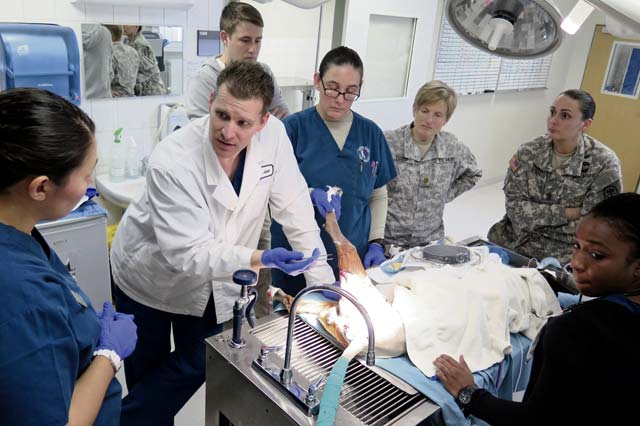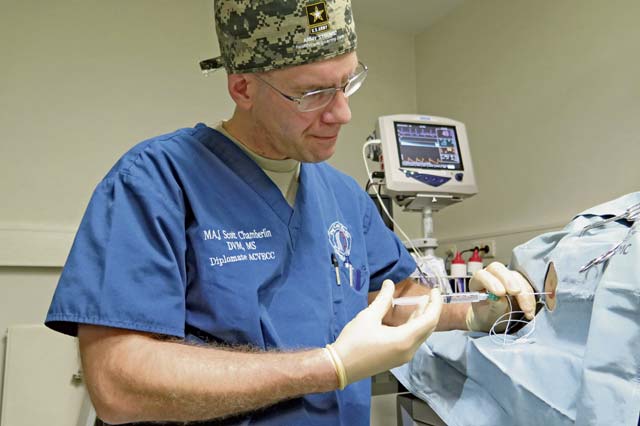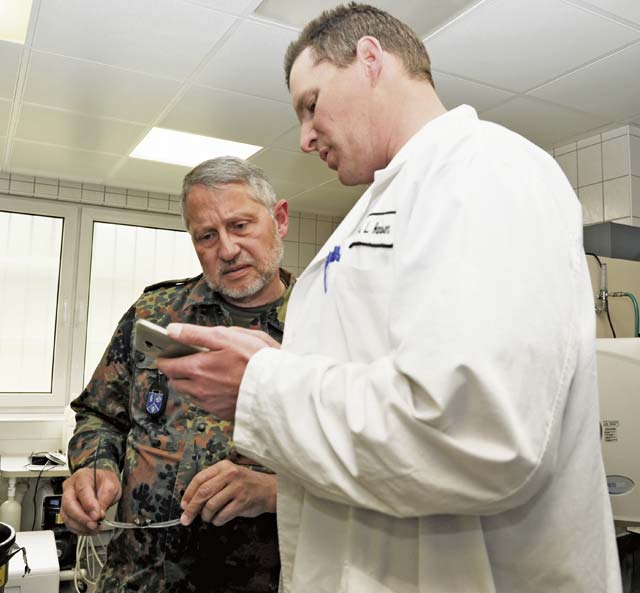
Dog Center Europe, located on Pulaski Barracks in Kaiserslautern, will undergo a name change and become Veterinary Medical Center Europe today.
The new name, according to Maj. Lane Hansen, DCE director and veterinarian, better reflects the array of services that are currently provided to the military community.
“We have been proud to serve the military community for many years under a series of names and forms,” Hansen said. “For the past few years we have been serving the community as Dog Center Europe and while we are proud of this name that represents our commitment to the military working dogs, we have found that it creates some confusion for those who seek veterinary care in the community — thinking that we only serve dogs or only working dogs. We are updating our name to reduce this confusion and let the community know that we also have a place for their pets.”
The mission and services offered at the center will not change.
“The new name does not change our mission but it does highlight our available services,” Hansen said. “We seek to provide the best service to the community that we can within the constraints of meeting our mission requirement of providing full care to MWDs.”
DCE’s mission is to provide comprehensive veterinary care to military working dogs. Similar to the care Landstuhl Regional Medical Center provides to injured service members, DCE is a Category IV hospital for military working dogs that are evacuated from a combat theater or distant duty site.
DCE provides veterinary medical care to the regionally aligned MWDs, eligible pets in the Kaiserslautern Military Community on a space-available basis, as well as referral cases from across Europe.
For the MWDs, Hansen said “our MWD team provides twice annual wellness examinations to each MWD; monthly visits to the supported kennels and travel examinations for dogs transiting through [Ramstein]. Our specialty team provides comprehensive support to the Veterinary Corps officers assigned across this part of the world. Support ranges from telehealth consultations to referral and evaluation at our facility.”
He said the DCE team also visits outlying sites and “provides training and support to the veterinary teams stationed across Europe to increase their skills, knowledge and proficiency.”
Taking care of MWDs isn’t just the job of the veterinarians. DCE works closely with the handlers to help them better understand their dog and the care they need.

“Our MWD team works closely with the kennels to share good practices and identify concerns that could lead to a decrease in MWD health and readiness,” Hansen said. “We conduct periodic training with the dog handlers to teach basic ‘buddy aid’ medical skills and ensure that the handlers are prepared for emergencies — especially when deployed.”
MWD handlers play a critical role in caring for their dogs, Hansen said.
“They spend a considerable amount of time with them and frequently are able to identify subtle behavior changes that signal disease,” Hansen said. “They help the dogs to maintain their weight, remain active, provide prescribed treatments, and bond emotionally with the dogs.”
MWDs are a huge part of the Army team, and while they don’t wear a uniform, keeping them mission-ready is an important task.
“MWDs are force multipliers and play a critical role in protecting the service member, their families and infrastructure of our military,” Hansen said. “Doing all we can to ensure that these valuable dogs are medically ready is a source of pride and professionalism for our veterinary team. Many of these dogs win our hearts as we provide care to them over the years they serve.”
In December 2015, DCE cared for a MWD that was injured in Afghanistan by an improvised explosive device. Both the dog, Rocky, and his handler were injured, and Rocky was evacuated to DCE.
“Our team, together with working dog handlers from the Ramstein and Miesau kennels, provided thousands of hours of care to return him to health,” Hansen said. “Ultimately, with our care Rocky was able to regain use of his injured leg, return to his home duty station and recently was medically retired to his injured handler. His case highlighted the depth and breadth of care that we can provide.”
In addition to working with MWDs, DCE sees more than 500 pets a month and provides services ranging from wellness examinations to specialty referral care.
Wellness-focused care, according to Hansen, is helping to keep pets healthy and free of diseases that could be transmitted to people.
“We work to educate owners about the risk of rabies, intestinal parasites, and other diseases that can make pets and people sick.”
These appointments, which include: wellness evaluations, routine vaccinations, pet travel guidance/health certificates, and sick pet examination, are made on a space-available basis.
Additionally, on a space-available basis, referral or specialty-level care is available to service members’ pets.
“We offer advanced medical and surgical diagnosis, testing and treatment on a consultation or referral basis,” Hansen said. “We regularly work with Army Veterinarians across Europe to aid with cases and some of those owners travel with their pets to our hospital for care.”
As Pulaski Barracks prepares to close this coming fall, Veterinary Medical Center Europe will eventually leave its current location and move to Miesau Army Depot, about 20 minutes down the road.
“Unfortunately, our new hospital that is being built on Miesau Army Depot is not anticipated to be complete until late 2019,” Hansen said. “We have been assured that we can remain in our present facility until our new hospital is complete.”
For more information on Dog Center Europe/Veterinary Medical Center Europe, like them on Facebook, https://www.facebook.com/avceur/



